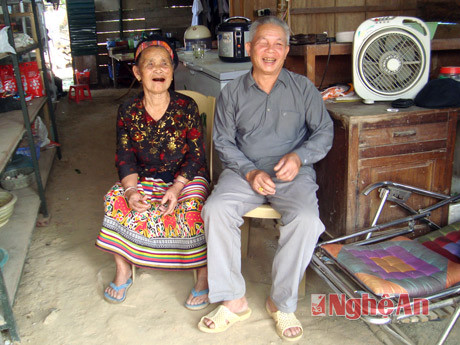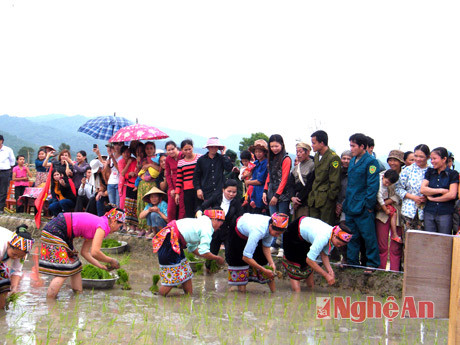"Chò tree" of Bai Xa village
(Baonghean) - Past the "old age", village elder Lo Huu Chien in Bai Xa village, Tam Quang commune, Tuong Duong district is like a tall, sturdy Chò tree spreading shade, a spiritual support for ethnic people to firmly walk on their thorny and challenging path.
Once the Deputy Secretary of the Tuong Duong District Party Committee, together with the district Party Committee, he proposed the policy of building and developing the district's economy. When he retired, he had the thought in mind: "Uncle Ho taught that "If a Party official says something, he must do it", I have directed the people to do it, now that I am retired, I must also do it, otherwise the people will no longer believe me". Thinking so, the couple worked hard to clear a hill of cogon grass, open fields to grow peanuts, cassava, and meters, and then received support from Pu Mat Forestry Department for eucalyptus seedlings.planted more than five hundred trees.
At first, the trees grew well, but soon the cattle were allowed to roam freely and people were not in agreement, and the forest gradually fell apart. Silently watching the scene of more than 500 eucalyptus trees broken and dead, he felt sorry: "As a Party official, I could not do what the Party told me to do, but I tried my best to call on the people to do it, it is really shameful". From then on, he still took care of the village's affairs but his heart was heavy with sadness.
In 2002, the province built a paper mill, launched and assigned a plan for districts to plant acacia trees, and his family was assigned 10 hectares of forest. So, with a machete and a canteen, the couple spent three months clearing the forest. He went to Tuong Duong Forestry to ask about how to plant acacia trees, dug holes properly, and spent money to buy 500 seedlings. After the Lunar New Year (2005), the couple, father and son, went to plant 500 trees and bought barbed wire to fence them. The dry season in the highlands causes the soil to dry out, and the young trees will die. The couple had to work hard to build a small dam in Pho stream to get water, carrying hundreds of buckets of water every three days. "Officers! With a large salary, go home and drink alcohol. Why bother planting trees?" Hearing the villagers say that, he happily told them about the benefits of planting forests, convincing them to work together and protect them. The trees were green and flourishing, he was very happy and encouraged his son to work together, spreading more than 1 hectare on both sides of the stream and by November of that year, he had planted 3,000 more trees. During the dry season, the trees lacked water. The whole family went to fetch water for irrigation for three months. "Those days were extremely tiring, but I was worried that the trees would die, so I couldn't do what I said and tried my best. Looking at the trees growing green and flourishing, I forgot all my fatigue. So the villagers followed suit and planted the acacia forest, and the forest expanded day by day" - He smiled happily and told me with pride.
 |
| The joy of Mr. Chien and his wife. Photo: D.M |
Chairman Luong Thanh Hai took the village chiefs and elders to visit and study. He was pleased because he had fulfilled Uncle Ho's teaching: "Party members must strive to be a model for the masses to follow." In November 2009, at the first Congress of Nghe An ethnic minorities, he was awarded a Certificate of Merit by the Chairman of the Provincial People's Committee.
However, the price of glue fell, and he lost hundreds of millions of dong. But he did not accept defeat, and was suggested by the commune officials, so he and the villagers chose suitable trees with high income to plant. Bai Xa forest is now full of trees, the green color of life has flourished, and old Chien is very happy, because he said he could do it, and then he brought everyone along to do it.
Now over 70 years old and not strong enough to plant forests and clear fields, he transferred all the land and forest to his eldest son, and as a village elder, he returned to the role of organizer and mobiliser of all activities of the villagers. The Party proposed a new rural construction program with many criteria, the program returned to the village and he was one of 9 people in that mobilization committee. The first thing needed in Bai Xa village was to build concrete roads to each house with the requirement of the main axis being 5m wide, the other axes being 4m wide. Together with village chief Vi Van Thuyet, he went to each house, first of all the families, to persuade them to give up their land to open the road. Mr. Luong Van Hoa, Lo Van Toi, Lo Xuan Viet, Vi Dinh Hung, Vi Van Dung and many other villagers happily gave up their land and cut down trees to widen the road.
 |
| Rice planting competition in Bai Xa village - Tuong Duong. Photo: Ho Phuong |
According to calculations: the district has provided cement, the village needs 50 million VND to buy raw materials, which means each family must contribute 300,000 VND, which is not a small amount for many families. He and representatives of the Women's Union, Veterans Association... went to each house to mobilize each person to contribute. With the villagers' agreement, it only took 3 days to clear the road, 7 days later the people worked, the officers supervised, the main road of the village, 1km long, was completed.
This fourth quarter, the Party cell decided to complete the remaining road branches, each household still had to contribute 300,000 VND. All families were ready, but when the decision to ban sand and gravel mining was made, where would we get 110 trucks of sand and gravel to do it? Everyone could not figure it out. Taking care of the house never kept me awake, but taking care of the village kept me awake at night, so he tried to find a way to get the materials. He went to the sand and gravel bank by the river and saw that the quality was good, so he told the village chief to invite Party Secretary Lo Van Ly and Commune Chairman Ho Viet Son to come down and give his opinion. "Now the sand and gravel have filled the road, and the money is ready. After the harvest, we will do it at the end of November. The important criteria for building a new countryside will be achieved, my Bai Xa village will become more and more united, prosperous and beautiful. My stomach is very happy, journalist!" Looking at his radiant face, I felt happy and full of admiration for a village elder who embodies the noble qualities of the Thai people: able to survive in any situation, young or old, always knowing how to do good deeds for the villagers, for himself, bringing happiness to himself and the community.
Knowing that Mr. Lo Huu Chien's family is one of the three typical cultural families of Tuong Duong district to be honored in the 5-year Congress of building Typical Cultural Families of the province, I am even happier for him and for the ethnic people of Tuong Duong district. When asked "What are you happiest about in your life?", he did not hesitate to say: "My life has many joys, but the happiest thing is that I am always a Party member, doing well the tasks assigned by the Party and the people need. I can do that because I always remember Uncle Ho's teaching: Party members and cadres must do what they say. I have said and tried to do what I told people so that everyone can do better. That is enough to satisfy me."
What a simple yet profound thought.
Duc Minh






